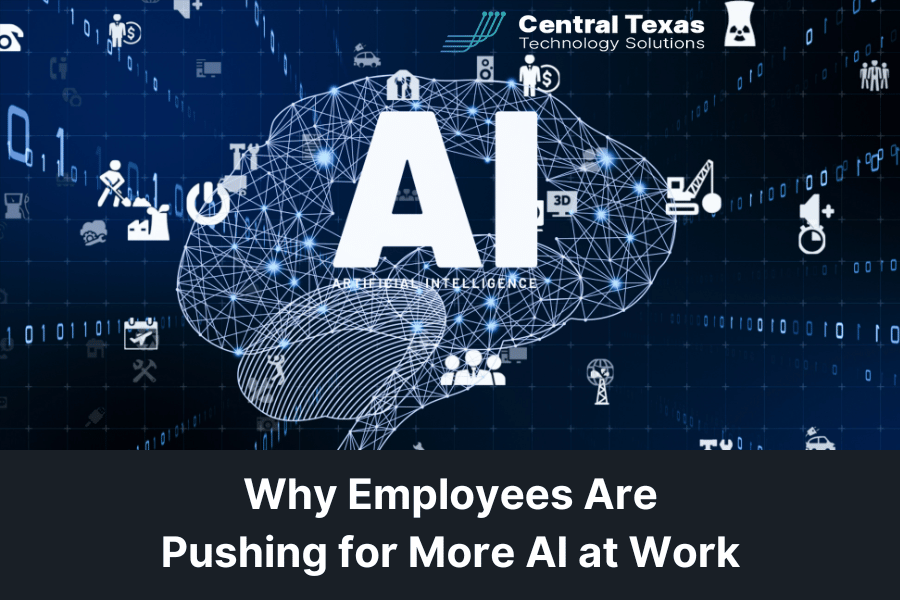
The Growing Demand for AI at Work
Being a business owner today means staying ahead of technological advancements, and AI at work is one of the biggest shifts reshaping industries. While some fear artificial intelligence will replace human employees, the reality is quite the opposite—workers are demanding more AI integration, not less.
AI is no longer just a futuristic concept; it’s a tool that enhances productivity, streamlines workflows, and improves job satisfaction. Companies that fail to embrace it risk falling behind in both efficiency and employee retention.
The Initial Fear: Will AI Replace Human Jobs?
When OpenAI launched ChatGPT in November 2022, it introduced a groundbreaking language model capable of generating human-like responses, stories, translations, and even coding assistance. This sparked widespread concern:
- Would AI take over human jobs?
- Would businesses choose AI tools over salaried employees to cut costs?
- Could AI outperform humans by eliminating fatigue and human error?
These fears weren’t unfounded. Even as of December 2024, a KPMG study found that 28% of employees still worry about job security due to AI. However, workplace attitudes toward AI are shifting. Rather than fearing AI, many employees are beginning to see it as an essential tool for career growth.
Why Employees Want More AI in the Workplace
AI is proving to be a valuable ally rather than a threat. According to the same KPMG study:
- 50% of employees believe AI has already helped their careers.
- 47% think AI will create new job opportunities rather than replace existing roles.
- 70% of workers use AI-powered automation tools weekly, with one-third relying on them daily.
So, how exactly are employees benefiting from AI at work?
1. Automating Repetitive and Mundane Tasks
Many workplace tasks follow a predictable, repetitive pattern—from processing returns to data entry. AI tools can handle these mundane responsibilities, allowing employees to:
✅ Focus on more strategic, creative, and engaging work.
✅ Reduce burnout from tedious, low-value tasks.
✅ Increase efficiency without sacrificing job satisfaction.
2. Optimizing Workflows and Making Predictions
AI at work isn't just about automation—it also improves decision-making. Businesses are leveraging AI analytics to:
🔹 Analyze customer trends and predict future demands.
🔹 Optimize inventory by identifying products that will sell best in upcoming quarters.
🔹 Enhance personalization, offering better customer experiences based on browsing habits.
3. Enhancing Workplace Operations
Employees benefit from AI-powered tools in various ways, including:
- AI Chatbots: Handling customer inquiries 24/7, reducing response times.
- AI-Driven Onboarding & Offboarding: Making HR processes smoother and more efficient.
- Fraud Detection Systems: Identifying unusual patterns to prevent security breaches.
Rather than replacing jobs, AI tools are empowering employees by eliminating inefficiencies and giving them the insights they need to succeed.
The Future of AI at Work: A Partnership, Not a Replacement
The consensus is clear: AI enhances human work rather than eliminating it. Employees are not just accepting AI—they’re demanding it because it makes their jobs more engaging and productive.
Companies that embrace AI at work will see:
✅ Happier, more engaged employees
✅ Higher productivity and efficiency
✅ A competitive advantage in their industry
The question isn’t if AI should be integrated into the workplace—it’s how soon businesses can adapt to meet employee expectations.
FAQ About AI at Work
1. Will AI take over human jobs?
No, AI is designed to assist employees, not replace them. It automates repetitive tasks and provides data-driven insights, allowing workers to focus on higher-value tasks that require human creativity and decision-making.
2. How can businesses implement AI without disrupting employees?
Companies should start by integrating AI into specific, repetitive tasks like customer service chatbots or data entry. Training employees on AI tools and highlighting how they can improve job performance will ease the transition.
3. What industries benefit most from AI at work?
AI is widely used across industries, including legal, healthcare, construction, and manufacturing. Any business that deals with large data sets, customer interactions, or operational efficiency can benefit from AI-powered solutions.
Contact CTTS today for IT support and managed services in Austin, TX. Let us handle your IT so you can focus on growing your business. Visit CTTSonline.com or call us at (512) 388-5559 to get started!
